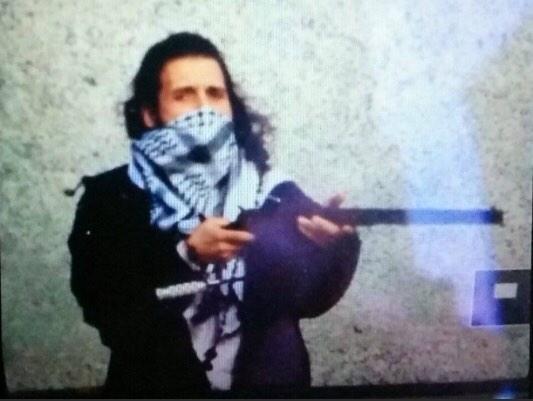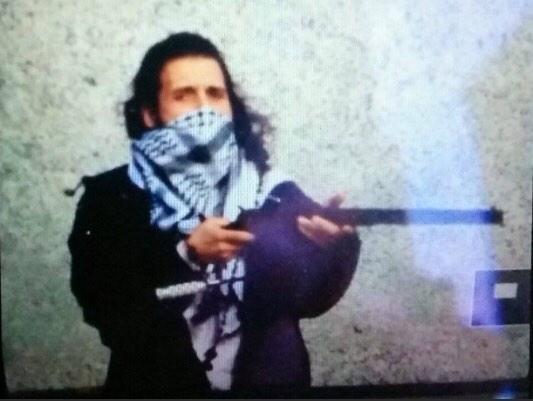Men who shared Ottawa Shelter with Michael Zehaf Bibeau during the past two weeks recount his anger at Canada and drug addiction

Michael Zehaf Bibeau killed one solider and wounded a police officer before being killed in his attack on Parliament Hill. Photo: Twitter
OTTAWA—The man who killed a soldier at the National War Memorial was angry about failing to get a passport and struggled with drug addiction, say those who knew him at the downtown Ottawa men’s shelter where he spent the last two weeks.
Michael Zehaf Bibeau so angered some of the men at the Ottawa Mission because of his complaints about Canada that there was almost a fight in recent days, said Norman LeBlanc, a 60-year-old former truck driver who frequents the shelter.
“He went on for more than an hour about how much this country sucked and how he wanted to get out of here, and he was furious about the passport,” LeBlanc said outside the mission Thursday.
“That made a lot of the others guys mad, and they were going to take him out back and give him a beating.”
Hours after the shooting Wednesday, police descended upon the mission, removing a hockey bag of materials from Zehaf Bibeau’s locker that was so heavy it required two men to haul it outside into an armoured vehicle, LeBlanc added.
Zehaf Bibeau often prayed with two Somali men in the shelter in an east-facing window in accordance with the Muslim faith, he added.
One of them, Abdel Kareem Abubakrr, denied his new friend’s actions had anything to do with his faith.
“He was suffering from drug addiction; he’d been clean for three months,” he said. “He was a crackhead, I think.”
Abubakrr said Zehaf Bibeau told the men at the shelter that he had left Vancouver for Ottawa because he wanted to obtain a passport. The Somali man said his new prayer-mate wanted to leave Canada to get treatment for his addiction because he didn’t feel he could get help in Canada.
Three days ago, Abubakkr said, Zehaf Bibeau began taking drugs again and began espousing “extremist ideas” after his passport application was rejected.
He didn’t elaborate about the nature of the extremist ideas.
“He was a good guy, he was talkative, a very lovely person, but he was a drug addict,” Abubakrr said. “In the last three days, he shifted.”
LeBlanc, however, disputed the notion that Zehaf Bibeau was back on drugs. In fact, he said, Zehaf Bibeau was overheard on a pay phone in the days prior to the shooting, talking to various car rental agencies about obtaining a vehicle.
“No one in a drug stupor is doing that; there’s no way.”
RCMP said Thursday that Bibeau had actually purchased a car on Tuesday. The Mounties also confirmed he’d come to Ottawa to try to get a passport.
Video footage aired on CBC shows Zehaf Bibeau, 32, coolly getting into a car immediately after shooting and killing Cpl. Nathan Cirillo, a reservist from Hamilton who was standing guard at the National War Memorial.
Moments later, Zehaf Bibeau opened fire in the halls of Parliament. He soon died in a gunfight in the Hall of Honour.
A search of the publicly available Quebec court records database indicates a man by Bibeau’s name had a lengthy criminal record with several convictions and brushes with the law in the early and mid-2000s. According to the records, the man would have turned 32 last week, on Oct. 16.
The records appear under three different names — Michael Bibeau, Michael Zehaf Bibeau and Michael Bibeau Zehaf.
The last time his name appears in the provincial court database is for a charge in 2006. For that marijuana-related count, he pleaded guilty in court in 2009 and received an absolute discharge.
A source has also said that Zehaf Bibeau had been denied a passport “in the normal course of applying,” but he was not under surveillance by security officials.
Zehaf Bibeau’s mother, Susan Bibeau, released a statement on Thursday apologizing for her son’s actions.
“We have no explanation to offer,” the statement read.
“I am mad at our son; I don’t understand and part of me wants to hate him at this time …. (He) was lost and did not fit in. I, his mother, spoke with him last week over lunch; I had not seen him for over five years before that. So I have very little insight to offer.”
Another man at the mission, Tom Wilson, said Zehaf Bibeau slept in the bunk beneath him on his first night at the shelter after they checked in together two weeks ago.
“He had this big hockey bag that he put down on the ground and it sounded like it was really heavy so I asked him, just as a joke: ‘What, have you got a body in there? What the hell is in there?”’ said Wilson.
“This past Sunday, I saw him down in the lobby all irritated about something, saying: ‘I gotta get out of here.”’
A man at a Vancouver shelter, who would only be identified by his first name, Steve, said he knew Zehaf Bibeau.
The would-be gunman and Steve got acquainted in rehab two years ago, but more recently Zehaf Bibeau said he wanted to go to Libya, his father’s birthplace.
Zehaf Bibeau said he was getting paid cash as a mover and unloading trailers, Steve said, and spent money on crack and heroin.
“He had some problem with his passport and he wanted to get that sorted out so he could go to Libya,” he said. “He hitchhiked from here some time in September to get to Ottawa.”
With files from James Keller in Vancouver and The Associated Press
This article was originally published on iPolitics and is reprinted here with permission as part of the partnership between iPolitics and the Canadian University Press


